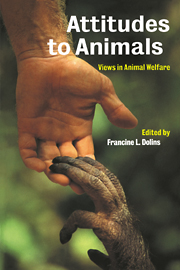Book contents
- Frontmatter
- Contents
- List of contributors
- Acknowledgements
- Part I Attitudes to animals
- 1 A look back in the mirror: perspectives on animals and ethics
- 2 Me and my totem: cross-cultural attitudes towards animals
- 3 Sheep in wolves' clothing? Attitudes to animals among farmers and scientists
- Part II Animal awareness
- Part III Animal welfare
- Part IV Research and education
- Part V Epilogue: the future of wild animals
- Index
1 - A look back in the mirror: perspectives on animals and ethics
Published online by Cambridge University Press: 16 November 2009
- Frontmatter
- Contents
- List of contributors
- Acknowledgements
- Part I Attitudes to animals
- 1 A look back in the mirror: perspectives on animals and ethics
- 2 Me and my totem: cross-cultural attitudes towards animals
- 3 Sheep in wolves' clothing? Attitudes to animals among farmers and scientists
- Part II Animal awareness
- Part III Animal welfare
- Part IV Research and education
- Part V Epilogue: the future of wild animals
- Index
Summary
A bundle of grey and gold hair, three Eulemur fulvus rufus, the red-fronted brown lemur, were huddled on an angled branch at least 50 feet above where I sat. Most lemur species are highly endangered; I watched these fulvus, recognizing that their fate relied not on their survival by finding food and shelter when necessary, but on the fate of a conservation project whose success precariously balances between various interconnected programmes of education, health, research, eco-tourism, and foreign investment. This delicate balancing act attempts to keep itself upright amidst an onslaught of human needs, desires, and at times, greed.
Lemurs are endemic only in Madagascar. This makes it a special place for those who are concerned about the conservation and welfare of wild species of non-human primates. Yet, for those humans who inhabit this land where the forest is their primary resource for survival, their needs come into direct conflict with the lemurs, a westernized version of a valued ‘flagship’ species. The Malagasy who live in rural areas depend almost entirely on the land, what they can grow and what they can extract fromit. In the cities, the people are dependent on those who have grown and extracted from the land. Their immediate survival needs depend on land and forest clearance, and are not always in parallel with those of the many species of lemurs. The lemurs' state of conservation, however, may be of little consequence when human poverty and sickness are more than apparent.
- Type
- Chapter
- Information
- Attitudes to AnimalsViews in Animal Welfare, pp. 3 - 11Publisher: Cambridge University PressPrint publication year: 1999



